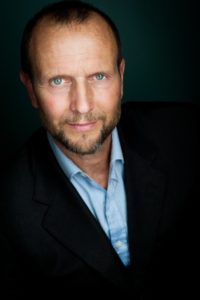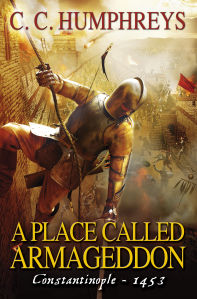 Best-selling author C.C. Humphreys (Chris) is as charming as he is brilliant. His novels of historical fiction thrillers include The French Executioner, Blood Ties, Vlad, A Place Called Armageddon, Shakespeare’s Rebel, Chasing the Wind, Fire and the Jack Absolute series. He also writes for young adults with The Hunt of the Unicorn Series and The Runestone Saga. As an accomplished actor and swordsman, Humphreys has had numerous roles all over the world, including in Highlander and Zorro. Humphreys won the ‘Arthur Ellis’, Canada’s Crime Writers’ Association Best Crime Novel Award for Plague and in 2015. What follows is an abridged version of the interview he did in conjunction with his teaching of historical fiction in the upcoming 2020 Willamette Writers Conference.
Best-selling author C.C. Humphreys (Chris) is as charming as he is brilliant. His novels of historical fiction thrillers include The French Executioner, Blood Ties, Vlad, A Place Called Armageddon, Shakespeare’s Rebel, Chasing the Wind, Fire and the Jack Absolute series. He also writes for young adults with The Hunt of the Unicorn Series and The Runestone Saga. As an accomplished actor and swordsman, Humphreys has had numerous roles all over the world, including in Highlander and Zorro. Humphreys won the ‘Arthur Ellis’, Canada’s Crime Writers’ Association Best Crime Novel Award for Plague and in 2015. What follows is an abridged version of the interview he did in conjunction with his teaching of historical fiction in the upcoming 2020 Willamette Writers Conference.
Historical Fiction with Contemporary Resonance
ANDREW ADLEMAN: One of your novels of historical fiction, Plague, obviously relates to what the world has been going through.
CHRIS HUMPHREYS: It does seem that there is an appetite now for novels and films on the subject. People are trying to make sense of the world. One of the joys of writing historical fiction is that you go back and look at different periods of history that may play out in people’s consciousness today.
The Writing Process
ANDREW ADLEMAN: Can you talk a little about your creative process?
CHRIS HUMPHREYS: I’m someone who observes and I love history. The books we’re talking about, Plague and the sequel to that called Fire, are effectively religious fundamentalist serial killer stories set during the great plague and great fire in London, in 1665 and 1666. The great plague of London was obviously a horrendous time, but it serves more as a backdrop to my murder story. I’ve got the classic sort of mismatched cop duo at the center of it. While one is accused of the murder, they navigate the actual crime — trying to track down the killer — and also deal with the huge obstacle in the way, which is that people are dying everywhere. Fire is a continuation of that story, since, as many know, the plague was followed by fire and burnt down most of London.
Essentially what I do as a historical fiction writer — I take these backdrops and then set stories against them. A phrase I coined a few years ago to describe what I write is ‘the intimate epic.’ I write about big backdrops, such as my book A Place Called Armageddon which is about the fall of Constantinople in 1453. It’s a multi-narrator, with love stories, war stories, and redemption stories set against that sort of backdrop.
Characters in Historical Fiction
ANDREW ADLEMAN: While the big historical events are real, are the characters based on real people?
CHRIS HUMPHREYS: Not necessarily. What I do is fictionalize real characters and realize fictional ones. So there’s always a balance. My protagonists tend to be fictional, but my supporting cast is often the real characters. That’s not always the case. For example, in my novel Vlad: The Last Confession, the true history of Dracula. In that one, the protagonist is the man himself. There was a man named Vlad Dracula, who was a warlord otherwise known as Vlad the Impaler. But I usually take a real backdrop and create fictional characters to interact with the backdrop and real life people.
 A Place Called Armageddon by Chris “CC” Humphreys
A Place Called Armageddon by Chris “CC” Humphreys
Examples of What the Master Class Will Cover
ANDREW ADLEMAN: Can you describe your research process?
CHRIS HUMPHREYS: When teaching historical fiction, I talk about the process of writing, but also about my slightly different take on research. I have always loved history and love doing research. I used to think I needed to know everything about a subject before writing about it. But that’s the classic ‘research as procrastination’, one of many ways of getting in the way of us writers actually writing. So, in researching my first novel for the French Executioner Series, I researched for six years and thought I better put in everything I love. So I read all these books for six years and finally sat down and started writing the novel. Eighty-five percent of what I read never made it into the novel. Now, in researching, once I have the preliminary idea for the story, I’ll sit down and read for about two months. I’ll make notes and sometimes note that this event cold affect this character in this way.
ANDREW ADLEMAN: Can you talk about any other aspects of the class you’ll be teaching?
CHRIS HUMPHREYS: I sometimes do an exercise on how to use research as a springboard for the imagination. I often ask the class if they want to write. But they can write on their own time. Sometimes what they really want is little nuggets of information. Advice about style. Advice about process. Advice about many aspects of historical fiction.
ANDREW ADLEMAN: Thank you, Chris, for sharing your process with us!
To Join the Historical Fiction Master Class
To join C.C. Humphreys at the Willamette Writers Conference, register here. We look forward to seeing you there!
